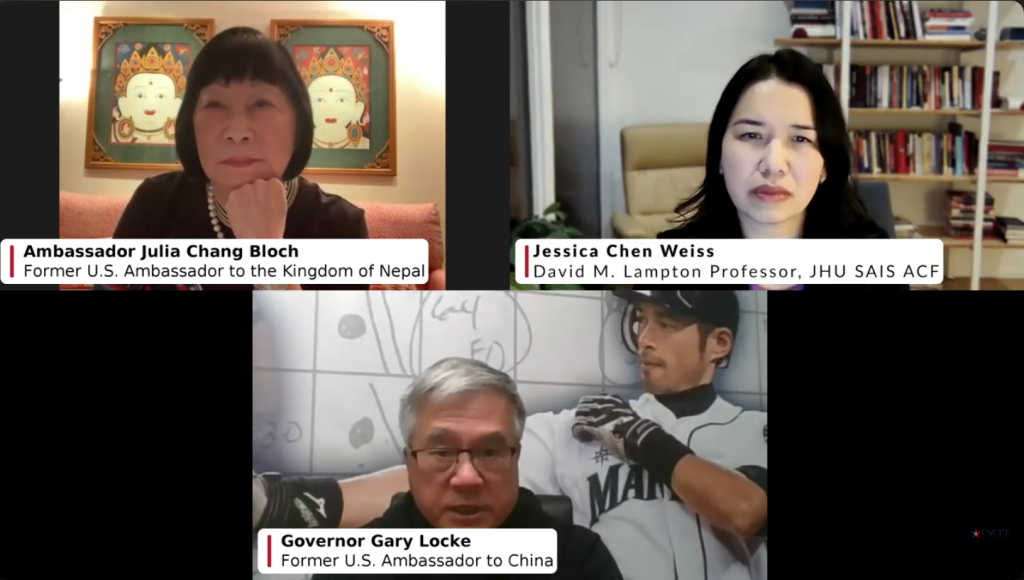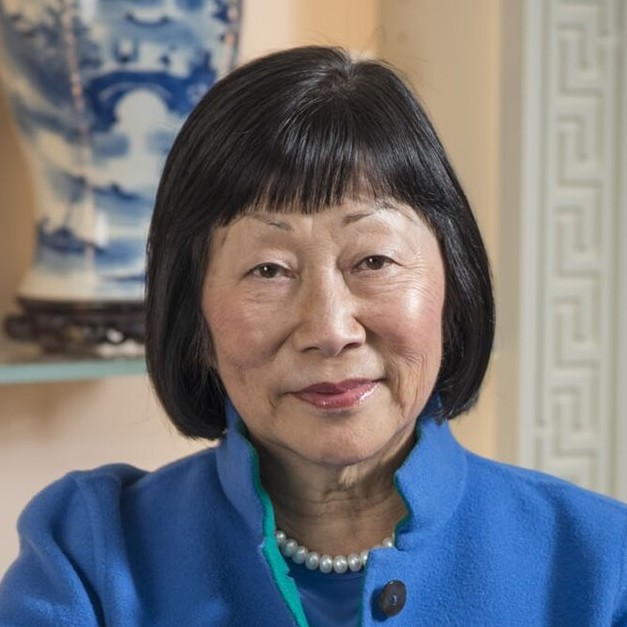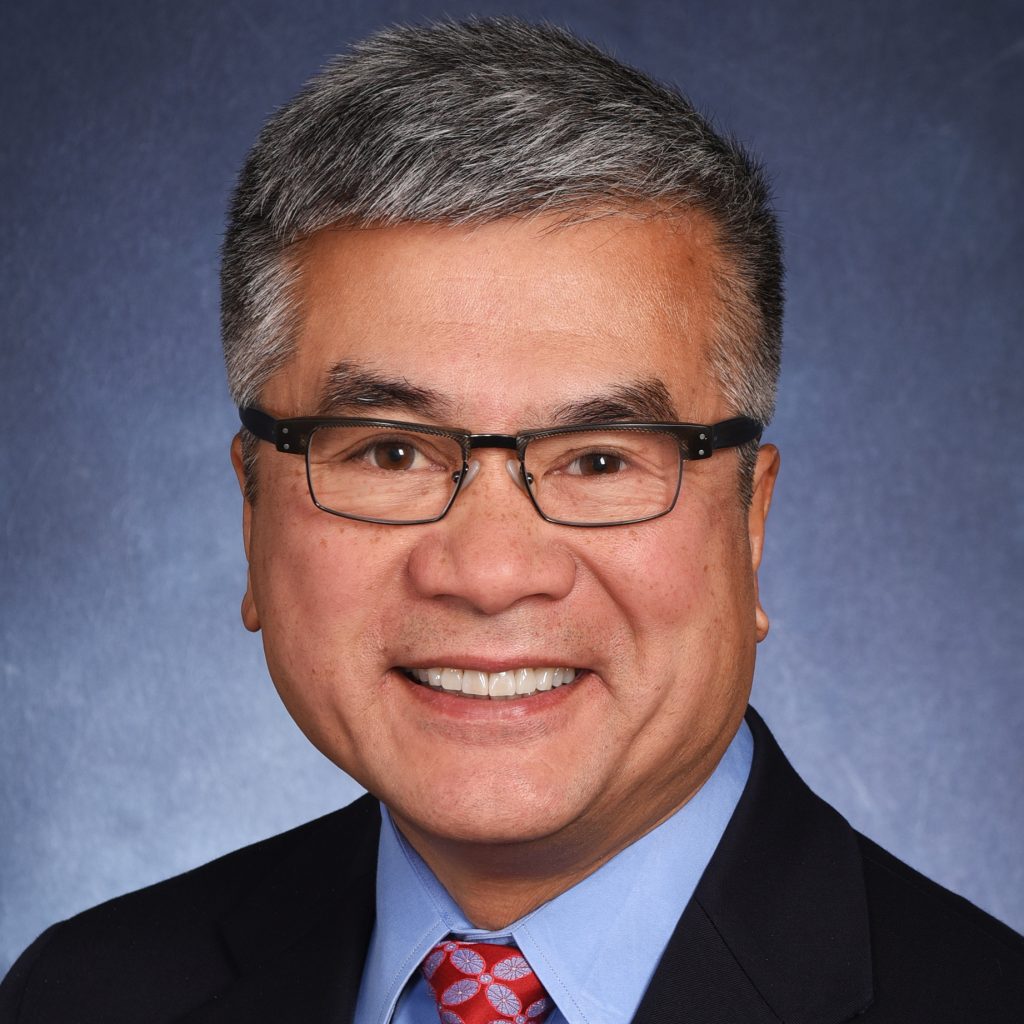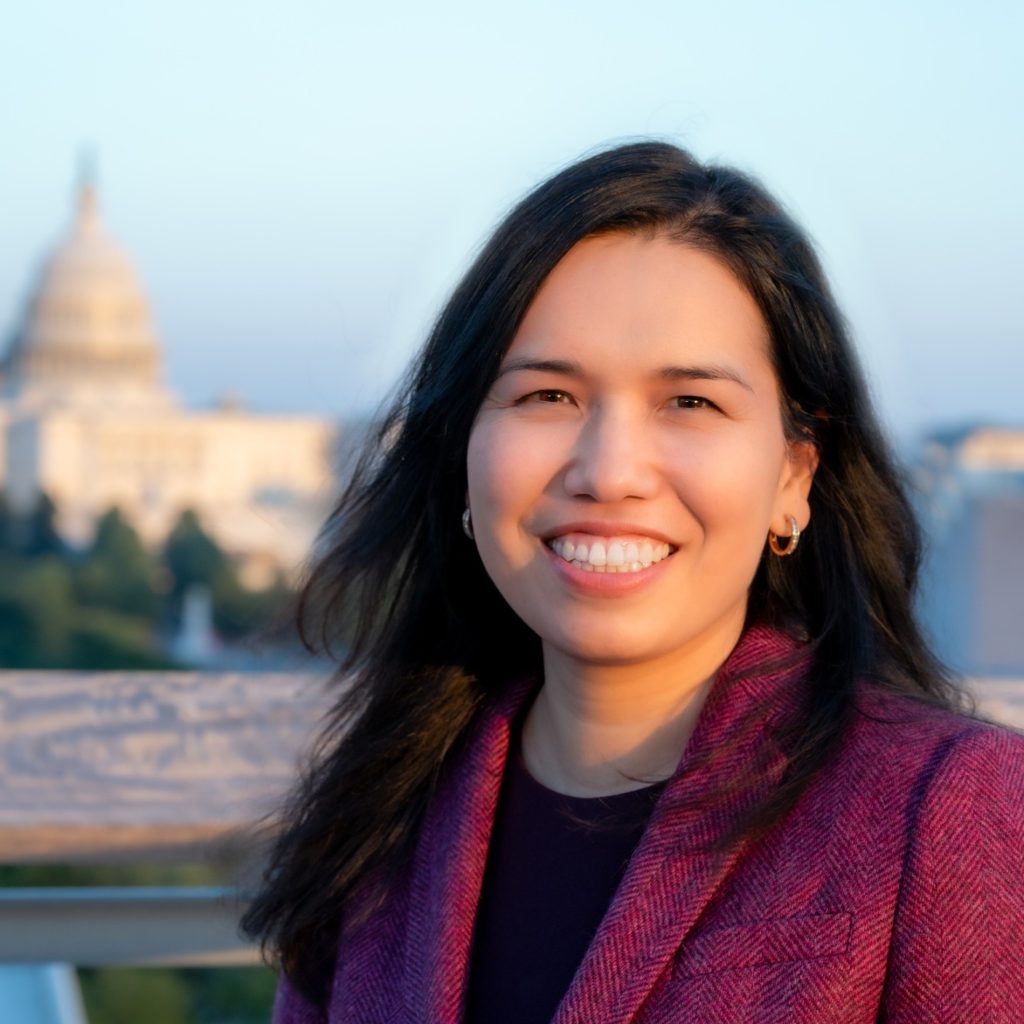
On October 16, the US-China Education Trust, APA Justice, and Committee of 100 hosted an expansive discussion between two distinguished Asian American ambassadors – Ambassador Julia Chang Bloch and Governor Gary Locke – whose personal journeys and family histories bridge both nations. They were joined in dialogue by Jessica Chen Weiss, David M. Lampton Professor of China Studies at Johns Hopkins SAIS.
Ambassador Bloch and Governor Locke drew on their experiences navigating the duality of their identities as U.S. public servants and Asian descendants. Ambassador Bloch began by noting that she owes much to the United States — the only country, she said, where the daughter of an immigrant could become an ambassador. While both speakers acknowledged the advantages of belonging to the Asian American community, they also discussed the persistent social barriers that come with it. One of the most enduring challenges, they observed, is that Asian Americans are still often viewed as “perpetual foreigners” in their own country because of their race and heritage. This mentality has fueled suspicions about the loyalties of Asian Americans, particularly Chinese Americans, amid the challenges in the U.S.-China relationship. They drew parallels to the treatment of Japanese Americans during World War II, when similar suspicions led to mass incarceration in internment camps. At the same time, the speakers emphasized that Asian Americans possess a unique strength: their ability to bridge cultures both within the United States and internationally. Ambassador Bloch reflected on how her Asian background helped her build trust with the local people while serving in the Peace Corps in Malaysia and later as U.S. Ambassador to Nepal. Together, they pointed out that while Asian Americans continue to face unfair treatment and systemic prejudice, their cross-cultural perspective remains one of the nation’s greatest assets.
“[Asian Americans] should not have to prove our loyalty than anyone else [should]… and we should not be forced to choose between heritage and country.“
Prof. Weiss engaged the speakers in discussion about how U.S.-China relations have evolved and what these changes mean for Asian Americans amid the intensifying competition between the two nations. In response, Ambassador Bloch and Governor Locke reflected on the trajectory of the bilateral relationship, from the early years of optimism and engagement following President Nixon’s visit to China to the mounting tensions exemplified by the 2018 China Initiative. Governor Locke predicted that these tensions are likely to persist but urged both countries to find ways to cooperate on shared global challenges, as collaboration is essential for many pressing issues, including climate change, technological innovation, and nuclear proliferation. Ambassador Bloch, reflecting on the broader social implications, noted that the current era differs fundamentally from the Cold War, as opportunities for people-to-people exchange are diminishing and mutual demonization is on the rise. She warned that if this trend continues, the United States risks falling into a self-fulfilling prophecy, perceiving Asians and Chinese as adversaries or even less than human, thereby creating conditions in which competition could escalate into conflict.
“We are losing something essential: our ability to see each other as people first.“
When confronted with deteriorating U.S.-China relations and growing fears over national security risks, both speakers shared their perspectives on the impact on the Asian American community and U.S.-China exchange. Governor Locke emphasized the importance of distinguishing between the Chinese people and the Chinese government, finding common humanity, and avoiding the stigmatization of an entire population. While acknowledging legitimate national security concerns, both speakers strongly opposed racial profiling or discrimination as a justifiable response. Ambassador Bloch noted that security measures should be targeted and evidence-based to ensure proportionality and effectiveness. When policies lack clarity and differentiation, they drive away talent and fail to make the United States safer or stronger. She concluded that the current treatment of Asian Americans and the disruption of exchanges with China and Asia are unjust and counterproductive.
“[Racial profiling and discrimination] are not just some moral failures. They are strategic disasters.“
Toward the end of the webinar, Ambassador Bloch and Governor Locke encouraged Asian Americans to unite, share their stories, engage with civil rights organizations, and participate in the political process by voting and running for office in response to the rising tide of anti-Asian discrimination. They emphasized that while Asian Americans have made substantial contributions to the nation’s innovation, infrastructure, and economy, these accomplishments are often under-acknowledged. While the Asian American community is frequently divided, both speakers stressed that all members should come together to advocate for the value of their labor, dedication, and contributions as Americans. They highlighted the importance of participating in decision-making at all levels, from local school boards to the White House, to promote policies that benefit the community and gradually improve the broader environment. Additionally, they emphasized the importance of financial support for organizations that protect Asian American rights and consistent civic engagement, such as voting, are essential tools for shaping policy and creating meaningful change.
Speaker Biography
Panelists

Ambassador Julia Chang Bloch is the first Asian American to serve as a U.S. Ambassador and the first Asian American Peace Corps Volunteer. She began her distinguished career in 1964 as a Volunteer in Malaysia and rose to become U.S. Ambassador to Nepal in 1989. Her public service included presidential appointments at the U.S. Agency for International Development, leadership roles in the U.S. Senate and U.S. Information Agency, and fellowships at Harvard University. She is recognized among 147 notable women in U.S. history in A to Z of American Women Leaders and Activists.
After 25 years in government, Ambassador Bloch entered the private sector in 1993 as Group Executive Vice President at Bank of America, where she led Public Relations, Government Affairs, and Public Policy. She later served as President and CEO of the United States-Japan Foundation and, beginning in 1998, shifted her focus to China as a visiting professor and academic leader at institutions including Peking University, Fudan University, and the University of Maryland. She is the Founding President and Executive Chair of the U.S.-China Education Trust (USCET) and co-founder of both the Organization of Chinese American Women and the Women’s Foreign Policy Group.

Gary Locke is Board Chair of the Committee of 100. When he was the Governor of Washington, he oversaw the creation of 280,000 new private sector jobs. His cabinet was the most diverse in state history, and over half his judicial appointees were women. His management skills and innovations won him acclaim from nationally recognized organizations, including Harvard’s Kennedy School of Government. During his tenure, Washington was ranked one of America’s four best-managed states.
As Commerce Secretary, he led President Obama’s National Export Initiative to double American exports; assumed a troubled 2010 Census, which, under his supervision, ended on time and $2 billion under budget; and achieved the most significant reduction in patent application processing in the agency’s history. As U.S. Ambassador to China, he opened markets for made-in-USA goods and services; reduced wait times for visa interviews of Chinese applicants from 100 days to 3; and, through the Embassy’s air quality monitoring program, exposed the severity of China’s air pollution. Locke obtained his JD from Boston University School of Law.
Moderator

Jessica Chen Weiss is the David M. Lampton Professor of China Studies at Johns Hopkins University’s School of Advanced International Studies and the inaugural faculty director of the Institute for America, China, and the Future of Global Affairs (ACF) at SAIS. From August 2021 to July 2022, she served as senior advisor to the Secretary’s Policy Planning Staff at the U.S. State Department on a Council on Foreign Relations Fellowship for Tenured International Relations Scholars (IAF-TIRS). Weiss is the author of Powerful Patriots: Nationalist Protest in China’s Foreign Relations (Oxford University Press, 2014). H
Her research appears in numerous reputable academic journals. With commentary in newspapers and the Ezra Klein show, Weiss was profiled by the New Yorker and named one of Prospect Magazine’s Top Thinkers for 2024. Weiss is also a nonresident senior fellow at the Asia Society Policy Institute Center for China Analysis and previously the Michael J. Zak Professor for China and Asia-Pacific Studies at Cornell University and an assistant professor at Yale University. She founded the Forum for American/Chinese Exchange at Stanford University. Born and raised in Seattle, Washington, she received her Ph.D. from the University of California, San Diego.
